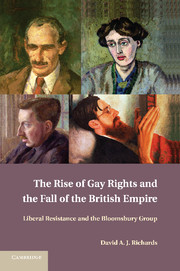 The Rise of Gay Rights and the Fall of the British Empire
The Rise of Gay Rights and the Fall of the British Empire Published online by Cambridge University Press: 05 June 2014
A patriarchal conception of political authority flourished in the imperial systems that have historically dominated human culture, a fact noted by Francis Fukuyama in his recent book. Imperialism is marked by two defining features: first, it began to self-identify in terms of the rule of its emperor, or the linguistic equivalent of such a ruler; second, “it began to issue orders to formerly autonomous states in the certainty that those orders would be obeyed.”
Various forms of Western imperialism, which arose self-consciously in the wake of the decline and fall of the Roman Empire, drew both vocabulary (kaiser in German and czar in Russian mean “caesar”) and a sense of their legitimate place in history from Rome, often measuring their achievements and their sense of looming threats from the study of Roman expansion and decline. It is thus no accident that generations of British imperialists, including Winston Churchill, closely read and studied Gibbon's multivolume The Decline and Fall of the Roman Empire. Western imperialisms also shared a common Augustinian patriarchal Christianity, albeit sometimes violently at odds over their quite different Catholic (Roman and Orthodox) and Protestant interpretations of the relationship of their Christianity to the legitimation of political authority. Perhaps the most extreme form of such imperialism was the theocratic Orthodox Catholic absolutism of the Russian czar over both church and state, at war not only with the competing imperialisms of the Ottoman Turks but of Protestant Britain.
To save this book to your Kindle, first ensure no-reply@cambridge.org is added to your Approved Personal Document E-mail List under your Personal Document Settings on the Manage Your Content and Devices page of your Amazon account. Then enter the ‘name’ part of your Kindle email address below. Find out more about saving to your Kindle.
Note you can select to save to either the @free.kindle.com or @kindle.com variations. ‘@free.kindle.com’ emails are free but can only be saved to your device when it is connected to wi-fi. ‘@kindle.com’ emails can be delivered even when you are not connected to wi-fi, but note that service fees apply.
Find out more about the Kindle Personal Document Service.
To save content items to your account, please confirm that you agree to abide by our usage policies. If this is the first time you use this feature, you will be asked to authorise Cambridge Core to connect with your account. Find out more about saving content to Dropbox.
To save content items to your account, please confirm that you agree to abide by our usage policies. If this is the first time you use this feature, you will be asked to authorise Cambridge Core to connect with your account. Find out more about saving content to Google Drive.